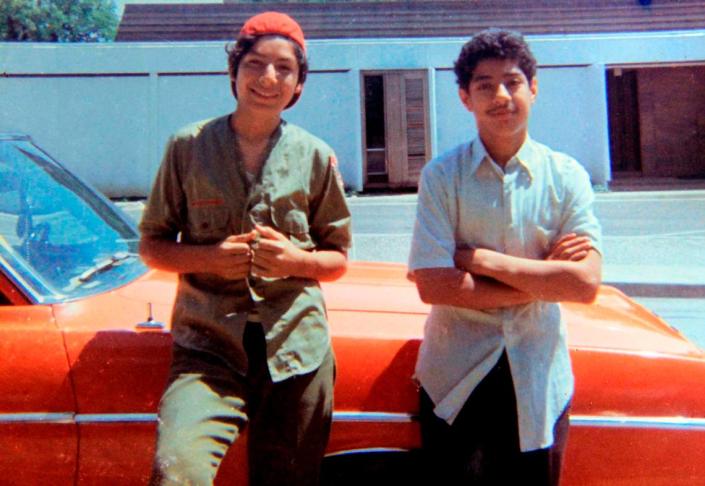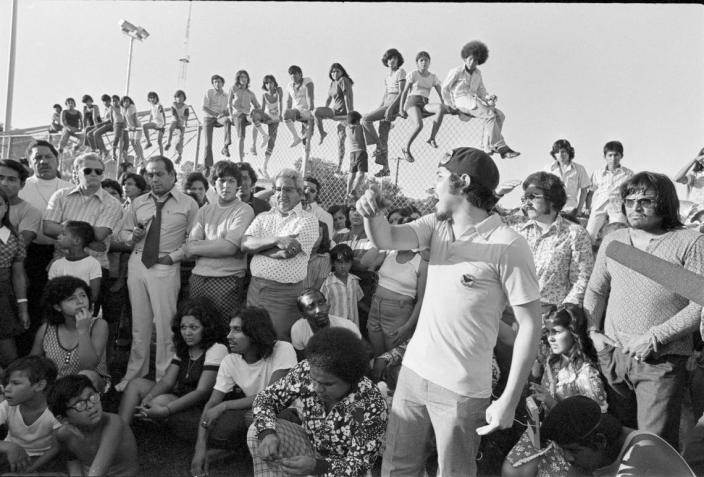On July 24, 1973, Dallas police officers Darrell Lee Cain and Roy R. Arnold arrested 12-year-old Santos and 13-year-old David Rodriguez at their home. Police told the brothers’ guardian, Carlos Minez, 84, who barely spoke English, that they were to question the boys about a burglary. Police handcuffed David and Santos, put them in Arnold’s police cruiser and drove to the Fina gas station, which they allegedly robbed and stole $8 from a soda machine.
According to media coverage, Arnold was driving with Santos in the front passenger seat while Cain sat in the back seat with David. Cain pointed his .357 Magnum revolver at Santos’ head and warned him to tell him the truth about the burglary. After pulling the trigger once while playing Russian roulette, Cain warned Santos again. The boy’s last words were, “I speak the truth. On the second trigger pull, Cain shot Santos in the back of the head.
Cain’s main defense was that he thought he had emptied all the bullets from the gun. Dallas Police Officer Jerry Foster, who was standing outside Arnold’s patrol car at the time of the shooting, examined Cain’s gun and found it fully loaded except for an empty chamber. Cain testified that he reloaded the gun immediately after the shot.

Santos’ murder has sparked anger in the Chicano community of Dallas. Rene Martinez, Pancho Medrano, Reverend Rudy Sanchez, the Brown Berets and others demanded justice. They met with Dallas Police Chief Frank Dyson and the Dallas City Council, demanding swift legal action and police reform.

I was stationed at Fort Hood (now Fort Cavazos) in Killeen when I heard the news of the murder. That weekend, I drove to Dallas to participate in the “March for Justice for Santos Rodriguez” on July 28, 1973. My voice joined the howls of hundreds of Latino and black protesters, expressing our anger at the murder. The chanting crowd, carrying signs, marched from Kennedy Plaza to Dallas City Hall, then located at 106 S. Harwood. Several local Chicano leaders spoke to the rally, which grew to more than 1,000, about injustice and the need for community unity.

After the march and rally, some protesters smashed store windows, set fire to a police motorcycle, damaged police vehicles and injured five police officers. Police dispersed the rioters, arresting 30 people.
Cain’s trial location was moved to Austin, where an all-white jury of seven men and five women deliberated the case. Dallas Assistant District Attorney Doug Mulder argued that Cain recklessly murdered Santos and deserved to go to jail. Defense attorneys Phil Burleson and Michael P. Gibson countered that Cain accidentally fired, thinking the gun was empty. Burleson warned that if Cain was found guilty, prison would be a death sentence. On November 16, 1973, the jury found Cain guilty of malicious murder and sentenced him to five years in prison. Cain’s attorneys appealed the verdict to the United States Supreme Court, but the justices declined to hear the case.

Cain served two and a half years at the Texas State Penitentiary in Huntsville, serving as a congregant. According to the director of the Texas Department of Corrections, Cain behaved like a model prisoner, which earned him an early release.
In 1978, LULAC, Latino Texas lawmakers, and other civil rights organizations appealed to President Jimmy Carter for his help in filing federal charges. Carter assured that the Justice Department would seriously look into the matter. Attorney General Griffin Bell declined to pursue additional charges, citing the time that had elapsed since the crime.
Santos’ mother, Bessie Rodriguez, wrote to Carter asking if her daughter had been murdered, would the killer have received a light sentence. She also wrote that if Santos had killed a policeman, his sentence would not have been as light as Cain’s.

The city of Dallas has worked to diversify its police department and train officers to root out racist practices. On September 21, 2013, Dallas Mayor Mike Rawlings apologized for this heinous crime. Dallas’ first Latino police chief Eddie Garcia, hired in 2021, has apologized to Bessie Rodriguez for the death of her son.
The city dedicated a statue to Santos at the Pike Park Recreation Center on February 9, 2022. The center was renamed the Santos Rodriguez Center. Human Rights Dallas formed the “Santos Vive” project and helped release a documentary of the same name, highlighting the murder, trial and community reaction.
Darrell Cain never worked as a police officer again and accepted a position as an adjuster in Lubbock. Died in 2019 at the age of 75, his obituary said in part: “There was also a special place in his heart for his canine friends…” No mention of Santos was made.
On the 50th anniversary of Santos Rodriguez’s murder, the Chicano community cannot forget his traumatic death. It still weighs heavily on our minds.
Author Richard J. Gonzales writes and talks about Fort Worth, national and international Latino history.

